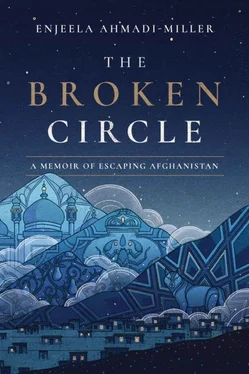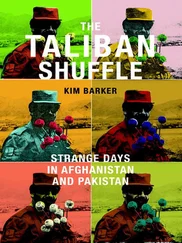In a candy store, I stopped in front of a large glass bowl filled with wrapped candy: luminescent reds, greens, yellows, and oranges filled it to the brim. I touched the glass. If I wanted one, I didn’t need to beg someone. I just needed to ask. All of those days of worry and meagerness were over. A load of fear and living on the edge of homelessness and hunger were over. A sense of relief came over me; life felt gladly lighter. I didn’t need to carry all the concern about my future on my own. In that instant something had been returned to me, something I had lost in those days of war in Kabul, in the mountains of my country, something that lives only in the heart of a child. I turned at a familiar voice behind me.
“Half an hour till our driver returns,” Mommy said, glancing at her watch. “Would you girls like a drink of tea before we leave?”
Vida bounced on her heels. Excitement radiated from her toes up through her face in an expression of perpetual fascination and fun.
“Yes.” I nodded, taking her hand.
Mommy led us to a shop with a bright-red awning with “Tea Shop” painted on it in bright yellow. The interior was dark and hot, hotter than it was outside, and it had to be in the nineties in the street. Music blared in the darkness. It was lit only by a shaft of yellow coming through the open door. All the tables were full except one along the far wall. We reached it, and Vida went to the counter and carried back a tall glass full of steaming chai. She held it by the brim with her fingertips. Mommy carried two more glasses to the table.
“This is for you,” she said. “I put extra milk in it.” Steam floated in a thin stream off the glass. But she didn’t hesitate to lift it and take several large gulps. With a satisfied moan, she set the empty glass on the table.
“It’s a little different from the chai at home,” Mommy said. “But I think you’ll like it.”
I leaned over my glass, inhaling deeper, and let the spicy aromas soak into my senses. The glass still steamed, but I laid my lips on the rim. I sipped the spicy tea—it was hot and sweet, creamy and soothing. It reminded me of how I used to feel sitting in the kitchen with Mommy years ago, basking in the warmth of our home. And now, here in this dingy shop, I had that same feeling. We were together. I tried to contain my smile.
“You like it?” Vida asked. She raised her eyebrows, expecting me to answer. She squiggled around to sit on her knees and leaned close to me. “Do you like it?”
I enjoyed making her wonder. So I took another sip, letting the warm liquid linger on my tongue. I suppressed a smile. Here we sat together, enjoying each other’s company after years of thinking this would never happen. I had allowed too many suspicions to creep into my thoughts that when I met Mommy and Vida, neither of them would remember me. Or even care that I was around. But that hadn’t happened. At this moment, I was a most wanted child and sister, and here in this shop, they both wanted me to enjoy this new land as much as they did. I stared into Vida’s bubbly dark eyes. Eyes that said she could just pick up our life that had been suddenly interrupted. In that dank, cramped shop, I understood how much had been returned to me on this sweltering day in the marketplace. I couldn’t hold it in any longer. “Yes, I love it. I love this chai shop. I love everything about India.”
And I meant it with all my heart.
Every morning, Vida woke me with her usual verve. She took it upon herself to coach me through my daily routine in Hindi till the words began to stick. Vida had little memory of her days in Kabul. When she left, she was but a toddler. India to her was home, and she had taken to the language, the food, and the way of life here with a natural enthusiasm. It oozed from her. She was reaching out to me with all of her heart to teach me about the beauty of this country, taking me to her favorite markets and to see her favorite movies. For years I had wanted to be here, but daily I found myself pining for somewhere else.
Padar and Mommy never talked of returning to Kabul. They discussed only news of the war, which had reached a terrifying pitch. It had turned even more murderous than when we had walked through the mountains and met the mujahideen fighting for their lives. The country was being destroyed, ripped apart, so that the Soviets could rework it in their own image. So many of my countrymen had been killed or maimed. It was hardly a place my parents wanted to raise their children.
In the fall they enrolled me in Vida’s school. Dressed in the same skirts and blouses, we went off each morning together. I didn’t know the language nearly as well as Vida did, who now spoke it like a native. Even though my classmates made a real effort to teach me what I needed to know so that I could play games with them at recess and lunch, I was a foreigner. A transplant. This was a land of bright colors in so many shades, and I felt like a dull shadow. Like the dun-colored mountains of my homeland.
When I was feeling particularly sorry for myself, if I couldn’t remember a particular word in Hindi or was having trouble with school because I was behind in my lessons, I reminded myself of Mina. If she were alive, she would give anything to be with me here. There was plenty of food, nice clothes, and a beautiful house to live in. She would relish every second of this life. I had been given the blessing of an exciting opportunity—a new life. A life many of my countrymen would embrace without hesitation. I didn’t know who to thank for my good fortune. But scowling over my misfortune didn’t seem like the right thing to do.
In autumn, when the air cooled and the leaves of the trees turned into bronze torches of flaming color, families prepared for the Diwali festival. First they lit candles and small lanterns throughout their entire house and placed more candles and ghee lanterns in their yard. All up and down the street, the brisk fall evenings became a luminous pageantry of light. Families walked the neighborhood greeting each other. In front of the local temples, large bonfires roared, flames licking up into the night, peeling back the darkness. The brighter the night became, the greater the celebration. It was a time of cheerful fun, greeting one another, handing out sweets and small gifts—a celebration of the triumph of the light over the darkness, good over evil.
Mommy lit up our home and served sweet Indian treats to visitors when they came by to greet us. She had become friends with many of the neighbors, and the week of festivities was a time of renewing relationships with friends and family. In the joyful revelry of the moment, the festivities eased away memories of the holidays in Kabul. The brightness of the night made the darkness of the street safe for children to run up and down. The very fear of what might lurk in the darkness had been erased. So many times on my journey, I had cringed under my blankets, fearing what might attack us. But on this night, there was no fear, as if the possibility of evil had been chased away.

Mommy’s friends, many of whom had children about the same age as Vida, visited often. They would sit around in the living room, chatting and sipping sweet tea while the children played outside. I often sat with them as they drank their chai and laughed as they talked about their lives, their children, their husbands. What struck me was the joyousness among them. The images of the mothers and daughters in the mountains of Afghanistan grieving the death of sons and husbands had soaked into my being. Tragedy was the only memory I had of so many women in Afghanistan. These visits delighted me, to see women enjoying their lives in a peaceful city. All of them had so much to look forward to. Life was different here, and I was beginning to enjoy being part of it.
Читать дальше













